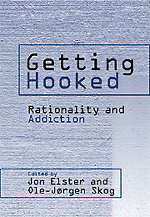Book contents
- Frontmatter
- Contents
- Preface and Acknowledgments
- Contributors
- Introduction
- Addiction and Social Interaction
- Addiction, Weakness of the Will, and Relapse
- The Dangers of Willpower
- The Neurobiology of Chemical Addiction
- To Legalize or Not to Legalize: Is That the Question?
- Rationality, Irrationality, and Addiction – Notes on Becker's and Murphy's Theory of Addiction
- Gambling and Addiction
- A Visceral Account of Addiction
- Epilogue: Rationally Coping with Lapses from Rationality
- Index
To Legalize or Not to Legalize: Is That the Question?
Published online by Cambridge University Press: 05 June 2012
- Frontmatter
- Contents
- Preface and Acknowledgments
- Contributors
- Introduction
- Addiction and Social Interaction
- Addiction, Weakness of the Will, and Relapse
- The Dangers of Willpower
- The Neurobiology of Chemical Addiction
- To Legalize or Not to Legalize: Is That the Question?
- Rationality, Irrationality, and Addiction – Notes on Becker's and Murphy's Theory of Addiction
- Gambling and Addiction
- A Visceral Account of Addiction
- Epilogue: Rationally Coping with Lapses from Rationality
- Index
Summary
Introduction
More than ten years after President Reagan promised victory in the war on drugs, drugs remain available in most parts of the United States. Moreover, the costs of the war have been high. Many leading intellectuals and some politicians are, therefore, demanding a new policy. “The war is lost.” In Europe, the war has always been controversial. The English drug policy has traditionally been dominated by a medical model with doctors rather than the drug squad in central position and addicts more seen as patients in need of treatment than criminals to be prosecuted. The Netherlands has a long-standing liberal policy in criminal matters and a disinclination to use restrictive measures. In countries such as Italy and Spain, there is a strong tendency to view a ban on drugs as moralizing.
Whereas skepticism toward the war on drugs has obvious merits, surrender is no acceptable alternative. It is obviously an immense exaggeration to see drugs as the root cause of most that is wrong with our societies. But today a new and equally faulty paradigm is gaining influence: The culprit is the war on drugs rather than the drugs themselves. As in Reagan's case, the solution is just as simple as the diagnosis: The war is to be replaced by legalization. The advocates of legalization have a rapidly growing influence in the European Parliament.
- Type
- Chapter
- Information
- Getting HookedRationality and Addiction, pp. 137 - 172Publisher: Cambridge University PressPrint publication year: 1999
- 6
- Cited by

